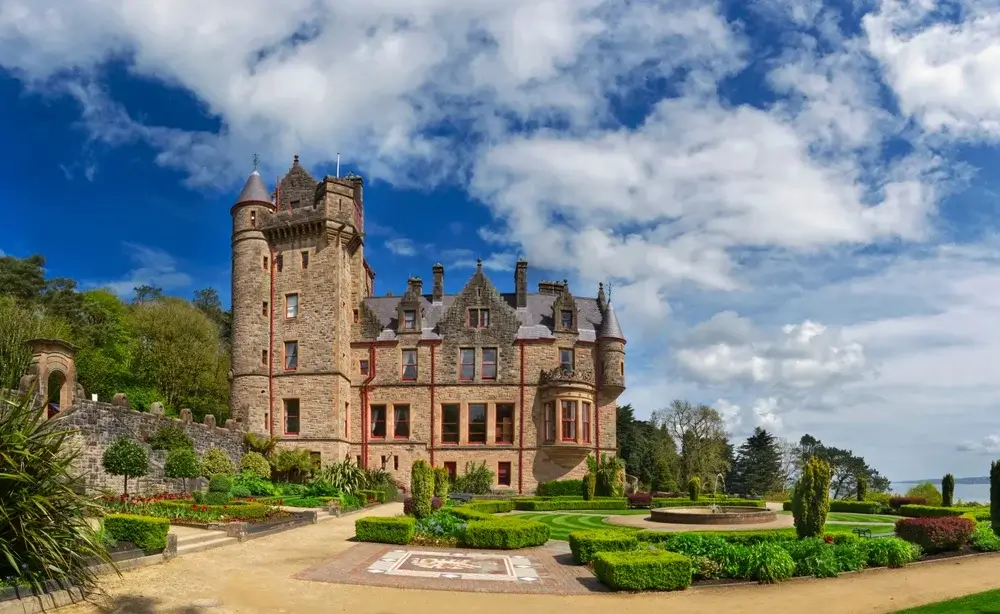Belfast
Belfast Travel Guide

Belfast, the capital of Northern Ireland, is a rich example of history, culture, and resilience. Over the years, it has experienced remarkable changes. The city's skyline showcases a fascinating mix of Victorian and contemporary architecture, with attractions like Titanic Belfast, which honors the legacy of the ill-fated RMS Titanic, constructed right here. The iconic Harland and Wolff shipyard remains a testament to Belfast's industrial roots. Culturally, Belfast thrives with a lively arts scene featuring theaters, galleries, and music venues. Throughout the year, the city hosts a variety of festivals celebrating film, music, and literature. The diverse community reflects a blend of traditions and languages, with an increasing emphasis on the Irish language. Recent initiatives, such as the Identity and Language (Northern Ireland) Act passed in 2022, aim to support and promote Irish, showcasing the city's commitment to inclusivity and resolution. Despite its challenging history, Belfast is celebrated for its warm hospitality and friendly locals. The culinary scene, influenced by both Irish and British traditions, offers hearty favorites like Irish stew and soda bread, often enjoyed in the city's numerous pubs and eateries. As Belfast continues to grow and change, it embraces its unique identity while striving for a brighter, more peaceful future.
Where is Belfast?
Belfast is the capital city of Northern Ireland, which is part of the United Kingdom. It is located on the east coast of the island of Ireland, at the mouth of the River Lagan on Belfast Lough. Belfast is the second-largest city on the island of Ireland, after Dublin in the Republic of Ireland. As of 2021, the city has a population of 343,542, while the metropolitan area has a population of 483,418.
The city is located in County Antrim, but parts of East and South Belfast are located in County Down. It is surrounded by hills and is bisected by the River Lagan
Where to Stay in Belfast?
Here’s a quick table of which areas in Belfast are great for tourists:
District | Best For | Best Attractions |
|---|---|---|
| Cathedral Quarter | Nightlife and Culture | St. Anne's Cathedral |
| Titanic Quarter | Maritime History | Titanic Belfast SS Nomadic |
| Botanic Avenue | Parks and Relaxation | Botanic Gardens Ulster Museum |
| City Centre | Shopping and Dining | Victoria Square Castlecourt Shopping Mall |
| Gaeltacht Quarter | Irish Culture | Traditional pubs Irish music venues |
Best Hotels in Belfast
Belfast hotels offer a blend of luxury and convenience, providing exceptional services and amenities for your trip to be more comfortable. Even though luxury hotels in Belfast may make you break the bank, they will be worth every penny thanks to their services. However, there are always mid-range and budget hotels in Belfast to enhance your days and make your city tour seamless. Tailored for everyone, finding what kind of accommodation you want won’t be as hard as you think. Now, here are some of the best hotels in Belfast we recommend and why:
Hotel | District | Affordability | Why To Stay There? |
| The Fitzwilliam Hotel | City Centre | Luxury | Elegant design, exceptional dining, and central location make it ideal for both leisure and business. |
| Culloden Estate and Spa | Outskirts of Belfast | Luxury | Historic grandeur with a luxury spa and fine dining; perfect for a relaxing getaway. |
| Europa Hotel | City Centre | Luxury | Known for celebrity guests, it offers elegant accommodations and is close to major attractions. |
| Titanic Hotel Belfast | Titanic Quarter | Luxury | Nautically themed hotel with rich history, located near the Titanic Experience. |
| Grand Central Hotel | Linen Quarter | Luxury | Features Ireland's tallest cocktail lounge and offers stunning views of the city. |
| Ac Hotels By Marriott Belfast | City Centre | Midrange | Contemporary design with great amenities, close to the Waterfront and major attractions. |
| Bullitt Hotel | City Centre | Midrange | Trendy atmosphere with multiple dining options and a vibrant bar scene. |
| Benedicts of Belfast | Golden Mile | Midrange | Popular for its lively music bar and stylish accommodations, located near many attractions. |
| Hilton Belfast | City Centre | Midrange | Convenient location near the airport, offers modern amenities and dining options. |
| Crowne Plaza Belfast | Outskirts of Belfast | Midrange | Features a fitness center and is close to the airport; ideal for business travelers. |
| Malone Lodge Hotel | Queen’s Quarter | Midrange | Victorian townhouse hotel offering charm and comfort, just a short drive from the airport. |
| Ballygally Castle | Antrim Coast | Midrange | Unique castle hotel experience with stunning views, about 30 minutes from the airport. |
| Ibis Belfast City Centre | City Centre | Budget | Affordable rates with comfortable rooms, located near shopping and dining options. |
| Travelodge Belfast | City Centre | Budget | Basic amenities at a great price, suitable for budget-conscious travelers. |
| Vagabonds Hostel | City Centre | Budget | A social atmosphere with dormitory and private rooms, perfect for backpackers. |
| Dunsilly Hotel | Antrim | Budget | Family-run hotel with comfortable accommodations, located conveniently for airport access. |
Best Belfast Attractions
Belfast is a lively place with a deep history and many things to see. It includes the famous Titanic Belfast, which honors the city's shipbuilding past, and beautiful parks and gardens for nature lovers. Now, let’s see what are these top Belfast attractions are:
- Titanic Belfast: The world's largest Titanic visitor experience, essential for any trip to Belfast.
- Ulster Museum: Features exhibits on dinosaurs, meteorites, and historical artifacts.
- Crumlin Road Gaol: A historic 19th-century jail that hosts tours and events.
- Belfast Zoological Gardens: Home to over 120 animal species, many endangered in the wild.
- W5: An award-winning science and discovery center offering fun and educational experiences for all ages.
- Belfast City Hall: An iconic civic building that opened in 1906, known for its stunning architecture.
- St George's Market: One of the oldest and best markets in the UK and Ireland, open on weekends.
- Belfast Castle Estate & Cave Hill Visitor Centre: A landmark built in the 1860s, offering scenic views and historical insights.
- CS Lewis Square: A public space celebrating the Belfast-born author of The Chronicles of Narnia.
Is Belfast Safe for Tourists?
Belfast is a safe place for both tourists and locals. It's a great place to live due to its history, cultural events, and welcoming community. It's seen as a neutral place and has overcome many of its 20th-century issues. Sectarian violence is now rare, and the city has transformed into a dynamic, forward-looking place.
Is Belfast Expensive to Visit?
A week trip to Belfast costs about $1,204 (£930) for a single person or $2,408 (£1,860) for a couple. For a family of four, a one-week trip would cost approximately $4,816 (£3,720), covering staying, meals, local transport, and tours. For a two-week trip, the cost is $2,408 (£1,860) for a solo traveler, $4,815 (£3,720) for a couple, or around $9,630 (£7,440) for a family of four, including similar expenses for accommodation, food, local transportation, and tours..
Currency & Exchange in Belfast
The official currency in Belfast, as part of the United Kingdom, is the Pound Sterling (£), which has the international code GBP. Before exchanging currency, compare rates from different providers.
Currency exchange services like eurochange and No1 Currency Exchange often offer better rates than banks. Checking online rates can also help you find the best deal. ATMs are widely available in Belfast and can provide competitive exchange rates. However, be aware of potential fees from your bank for overseas withdrawals. It's advisable to withdraw larger amounts at once to minimize fees rather than making multiple small withdrawals
Spoken Languages in Belfast
Belfast is mainly English-speaking but also has a wide range of languages due to its diverse population. English is the main language, but the city also values Irish and Ulster Scots as important local languages, with many people knowing some of these.
Immigrants have added to Belfast's language mix, with Polish, Chinese, Tagalog/Filipino, and Slovak being the most spoken immigrant languages. The city also supports its deaf and hard-of-hearing residents by recognizing several sign languages, such as British Sign Language (BSL), Irish Sign Language (ISL), and Northern Ireland Sign Language (NISL). Belfast's mix of languages shows its cultural richness and inclusivity.
How Many Days Are Enough to Visit Belfast?
If you want to really get the Belfast vibe, set aside three days to dive into its history, culture, and places to see. Belfast is one of the top cities in the world for its unique charm and personality. But, it's also a hidden gem, where locals are real and anyone who visits leaves feeling like they've stumbled upon something special.
When is the Best Time to Stay in Belfast?
The best time to check out Belfast is usually between June and September when it's warmest and you get the least amount of rain. This time is when the city is packed with tourists, with longer days and lots of fun outdoor stuff going on, perfect for checking out places like the Titanic Quarter and catching local festivals.
If you're not into big crowds or paying more, the off-season times of late spring and early autumn (May, June, and September) are pretty good too. The weather's still nice, and there aren't as many people around. Also, late November marks the arrival of Christmas markets across the UK, making it an ideal time to visit. Even if you don't plan to visit the markets, the streets are often more festive and vibrant during this period. However, it's best not to leave your visit too late, as the Christmas rush can make city centers extremely crowded. A visit between the 15th of November and the 15th of December is recommended for the best experience.
Temperature (°C/°F) | Activities | Rates | Crowd | Clothing | |
|---|---|---|---|---|---|
| Summer | 15-20°C (59-68°F) | Outdoor festivals Titanic Quarter tours Parks | Higher rates for hotels | High | Light clothing, shorts, t-shirts, sun hat |
| Spring | 8-15°C (46-59°F) | St. Patrick’s Day celebrations Blooming gardens | Moderate rates | Moderate | Layered clothing, light jacket |
| Fall | 8-14°C (46-57°F) | Autumn festivals Hiking in nearby parks | Moderate rates | Moderate | Layered clothing, light jacket |
| Winter | 2-8°C (36-46°F) | Christmas markets Indoor attractions Museums | Lower rates for hotels | Low to moderate | Warm clothing, coat, gloves |
What to Pack for Belfast Trip?
Here’s your quick packing list for Belfast:
- Clothing
- Comfortable walking shoes
- Seasonal clothing
- Rain jacket or umbrella
- Hat and sunglasses (sunny days)
- Dressy or smart casual for nice dinner
- Travel Essentials
- Valid passport and travel documents
- Travel adapter for UK plugs
- Portable charger/power bank
- Reusable water bottle
- Backpack for exploring
- Toiletries
- Sunscreen
- Toothbrush, toothpaste, and floss
- Personal hygiene items
- Moisturizer and lip balm
- Hairbrush/comb
- Miscellaneous
- Travel-sized laundry detergent for extended trips
- Reusable shopping bag for souvenirs
- Travel insurance information
- A notebook for stamps
What to Eat in Belfast?
Belfast cuisine is full of high calories which will satisfy all of your expectations. Exploration of Belfast won’t be fulfilled without trying these must-eat foods:
- Pastie: A deep-fried patty of minced meat, onions, and potatoes, commonly found in Belfast chip shops, with John Long's Fish & Chips offering a standout version.
- Ulster Fry: A Northern Irish twist on a full Irish breakfast, featuring soda bread, potato bread, and sometimes extras like tomatoes or mushrooms; popular at Maggie May’s and Bright’s.
- Oysters and Guinness: A classic Belfast pairing of fresh oysters with a dark Irish stout, available at historic pubs like Whites and The Oyster Rooms, or Mourne Seafood.
- Seafood Chowder: A rich soup combining potatoes, cream, smoked bacon, and various seafood, such as cod, haddock, salmon, mussels, and clams; try it at Made in Belfast or Love Fish.
- Colcannon and Champ: Two types of mashed potato dishes—colcannon with kale or cabbage, and champ with butter and scallions—available at Holohan’s Pantry and McHughs Bar.
- Irish Stew: A slow-cooked lamb or beef stew with potatoes, carrots, and onions, perfect for a cold day; enjoy at The Crown Liquor Saloon or Kelly’s Cellars.
- Breakfast Bap: A hearty bun filled with bacon, sausage, egg, grilled onions, mushrooms, and melted cheese, perfect after a night out; found at St. George’s Market or Belfast Bap Co.
- Traybakes: A no-bake treat made from crushed biscuits, condensed milk, chocolate, and dried fruit; served at home or trendy spots like Avoca Café.
- Yellowman Candy: A honeycomb candy popular at fairs and available at Aunt Sandra’s, a vintage-style confectionery in Belfast.
- Lamb: A sustainable, locally sourced meat featured in traditional and modern dishes, like lamb shank at Darcy’s or dry-aged lamb at SHU.
Belfast Nightlife & Entertainment
Belfast's music scene offers a variety of styles, from rock to traditional Irish music. Places like The Black Box and The Empire often have live shows, so there's something for everyone. The Cathedral Quarter is a great spot for its cultural feel and many bars, ideal for beginning a night out.
- Duke of York: A classic pub located in a cobbled alley, known for its live music and whiskey selection. It has a cozy atmosphere and is highly rated by visitors.
- Harp Bar: This stylish pub features plush decor and a regular live music calendar, making it a great spot for enjoying local talent.
- Voodoo: A lively venue for alternative music and club nights, offering a unique atmosphere with Deep South-inspired food.
- Alibi: A sophisticated three-floor venue serving cocktails and light bites, perfect for a more upscale night out.
- The Perch Rooftop Bar: A converted Victorian warehouse offering a relaxed rooftop setting for cocktails and pizzas, ideal for enjoying views of the city.
Nightclubs
- Filthy McNastys: A popular nightclub featuring multiple bars and live music, known for its vibrant atmosphere and themed nights.
- Limelight Belfast: A main venue for live music, hosting both local and international acts, along with club nights that cater to various musical tastes.
Enjoy Belfast's nightlife by planning your evening. Check venue opening times (usually 1-2 AM) and arrange a safe way back home. Belfast offers a variety of places like pubs, bars, and nightclubs for a fun night with music, dancing, and local culture.

